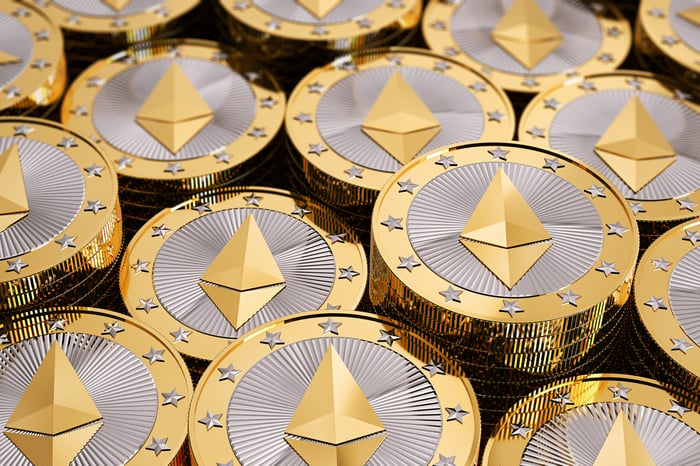Where Will Ethereum Be 10 Years From Now? (The Answer Might Surprise You)
Thus far, it's been an amazing decade for Ethereum (CRYPTO: ETH). Since its introduction in 2015, when Ethereum traded as low as $0.42, its price is up a sizzling 621,600%. And Ethereum is now the world's second-most valuable cryptocurrency, with a hefty $310 billion market cap.
So what can we expect during the next decade from Ethereum? Obviously, it will be difficult to replicate what it has already accomplished. But you might be surprised at what could be next.
Ethereum finally goes mainstream
With the launch of the new spot Ethereum exchange-traded funds (ETFs) back in July, it's now possible for anyone -- from the smallest individual investor to the biggest institutions -- to buy Ethereum just as easily as they buy their favorite tech stock. Already, more than $2 billion has flowed into these new spot Ethereum ETFs, and the expectation is that, over time, more and more investors will begin to have exposure to Ethereum in their portfolios.
But for Ethereum to go truly mainstream, more needs to be done. And that's because most people don't use Ethereum in their daily lives. They don't take advantage of new decentralized finance (DeFi) tools, they don't play blockchain games, they don't buy or sell non-fungible tokens (NFTs), and they have little or no idea of how a decentralized app differs from a traditional app.
That's something that Vitalik Buterin, the co-founder of Ethereum, wants to change. At the recent Token2049 crypto event in Singapore, he outlined his vision for the future of Ethereum. And something that he paid particular attention to was Ethereum's ease of use. As he put it, Ethereum is still not practical or usable enough. Transaction fees are still too high, and the overall user experience can be clunky and unwieldy. Many Ethereum user experiences, for example, still look like something you'd expect from a hackathon demo.
If this situation changes dramatically, Ethereum could soar in value. If you think about every niche of the Ethereum ecosystem (DeFi, gaming, NFTs) being a separate business unit, then it's easy to see how a higher valuation for each of these separate niches is going to add up to a much higher valuation for Ethereum. For example, investment firm VanEck thinks that the price of Ethereum could soar to $22,000 by the year 2030 from about $2,600 today.
Ethereum reinvents DeFi
Right now, the single biggest driver of value within the blockchain world is DeFi, and it's not even close. The total value of DeFi is about $100 billion, and Ethereum controls more than one-half of that market. So you can understand why so many investors use DeFi as a fundamental building block for establishing the future potential value of Ethereum.

Image source: Getty Images.
For example, Cathie Wood of Ark Invest thinks that smart contract platforms such as Ethereum could create as much as $5 trillion in market value during the next five years, as long as they continue to build out their DeFi offerings. And VanEck used DeFi as a core building block for its $22,000 price forecast.
If Ethereum is able to capture 50% or more of a $5 trillion market opportunity, then you can immediately see what kind of impact it could have on its future valuation. That's trillions of dollars in new market cap! By way of comparison, the current market cap of Bitcoin (CRYPTO: BTC) is about $1.2 trillion.
But there's just one problem: Vitalik Buterin is no longer a big fan of DeFi. He recently compared it to an ouroboros, or a serpent eating its own tail. That's because all DeFi users seem to care about is yield, and so it becomes an endless search for a new way to generate as much yield as possible. According to Buterin, that's the way traditional finance works, and he's not really excited to see Ethereum embrace this same mindset.
In fact, during the summer, there was heated debate within the Ethereum community about the value of DeFi. On the one hand, there were people who argued that DeFi should continue to be a core building block of Ethereum. On the other hand, there were people such as Vitalik Buterin, who argued that Ethereum should be turning its focus to other potential niches, such as decentralized identity systems.
Can Ethereum flip Bitcoin?
So you can see some of the key issues facing Ethereum. It must become cheaper to use, as well as more user-friendly. And there must be a practical reason for the everyday person to use Ethereum.
At the same time, Ethereum needs to find a way to reinvent DeFi. That's the one blockchain niche that really resonates with Wall Street investors, and hence, it's the one blockchain niche that can send the valuation of Ethereum soaring.
If all that happens -- and, admittedly, it's a big "if" -- then Ethereum might actually flip Bitcoin to become the most valuable cryptocurrency in the world. That might not be surprising to longtime crypto investors, who have been predicting "the flippening" for years, but it will surely come as a shock to those investors who think that Bitcoin will remain on top forever.
Should you invest $1,000 in Ethereum right now?
Before you buy stock in Ethereum, consider this:
The Motley Fool Stock Advisor analyst team just identified what they believe are the 10 best stocks for investors to buy now… and Ethereum wasn’t one of them. The 10 stocks that made the cut could produce monster returns in the coming years.
Consider when Nvidia made this list on April 15, 2005... if you invested $1,000 at the time of our recommendation, you’d have $743,952!*
Stock Advisor provides investors with an easy-to-follow blueprint for success, including guidance on building a portfolio, regular updates from analysts, and two new stock picks each month. The Stock Advisor service has more than quadrupled the return of S&P 500 since 2002*.
See the 10 stocks »
*Stock Advisor returns as of September 23, 2024
Dominic Basulto has positions in Bitcoin and Ethereum. The Motley Fool has positions in and recommends Bitcoin and Ethereum. The Motley Fool has a disclosure policy.
